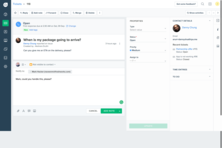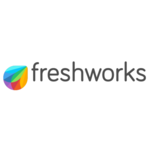It can be common for customers to feel that enterprise companies are impersonal in their customer service approach. As a result, customer service is an area that small businesses can outperform their enterprise counterparts.
Due to the time-limiting nature of small business employees being required to wear multiple hats, customer service software can be invaluable to streamline the customer support processes of small businesses.
The exact type of customer service software that small businesses need can vary based on their business model and the type of product or service provided. The two most common customer support solutions are help desk and live chat software.
Help desk solutions often provide a variety of customer service capabilities to help small businesses provide effective multi channel support. Common help desk software features can include the ability to implement a live website chat or an online phone line, automate ticket management, automatically escalate issues to the most relevant support agent, set up knowledge bases that cover common queries or issues, as well as generate reports and analytics on client satisfaction. Advanced features can also include video chat, the ability to view remote screens, file sharing, and feedback analysis.
Dedicated live chat solutions, on the other hand, are more lightweight than help desks. They focus more specifically on improving customer support by providing immediate help to customers via real-time chat and forego other more advanced help desk features that many small businesses may have no use for. As these solutions are often solely text-based, customer service agents can easily handle multiple chats at the same time. Furthermore, both customers and support agents benefit from conversation transcripts that can be kept for future reference, as well as chatbots or canned messages that can be set up to handle commonly recurring issues.
Overall, customer service software enables small businesses to save time and money on customer support, while customers also benefit from streamlined, round-the-clock support.

 Freshdesk is a fully-fledged customer service solution that enables small businesses to offer high-level customer service on a small budget. Users can start out with a free version and flexibly scale the solution alongside business growth.
Freshdesk is a fully-fledged customer service solution that enables small businesses to offer high-level customer service on a small budget. Users can start out with a free version and flexibly scale the solution alongside business growth.
Small businesses make use of customer service software as a way to build profitable and stable relationships with customers. While it may seem similar to customer relationship management (CRM), customer service software focuses mainly on providing the services offered by the company. It means handling communications between clients and employees through a number of channels such as email, live chat, phone and more.
Several features of these solutions have been designed to ease the process of taking in calls, logging customer interactions and making email ticketing for a small business. They provide an integrated workspace for the support agents and automated processes such as ticketing management.
FreshDesk, an online cloud-based omnichannel helpdesk software, is one of the top customer support tools on the market. It provides various features geared towards collaboration and productivity while also improving the ease with which support agents work. This involves escalation, automated routing, email integration and many more.
With this in mind, most customer service software solutions also have the following key functionalities:
Support agents are an integral part of a company’s workforce. Their job descriptions include receiving and answering customer inquiries on behalf of the organization or business they work for. As such, they must provide quality instruction and answers to resolve the customers’ problems.
The agent workspace feature equips support agents with an omnichannel console, productivity tools and a central view of the details and information for each case and customer interaction. Omni-channel refers to a cross-channel content strategy organizations use to improve user experience. It allows support agents to quickly see the most relevant data upon logging in such as pending, urgent and new support tickets. Support tickets, in this case, refers to a management tool that processes and catalogs customer service requests.
Furthermore, this feature is also customizable which allows you to edit the console to include only the necessary information. It also automates routine tasks and allows support agents to solve more cases at a quicker speed. By decluttering most of the vital tools used in customer service, agents become better equipped at handling calls and answering inquiries.
This feature cites several benefits once implemented in the system. It reduces workload stress by keeping all of the support agents connected and up-to-date on the company’s activities, processes and information. Every time a problem arises for the agents, they can access the information regarding any specific steps or answers needed to resolve a case.
By giving you an overview of each case taken on by the agents, learning to manage customer communications across all channels becomes easier. You’re given access to the information around all customer interactions, inclusive of the chronological/timeline, voicemail, email updates, knowledge articles or anything else involving that specific case. This helps in routing the right case to the right agent in order to reach the right resolution.
Similar to case management but tailored specifically for tickets, this feature is one of the core functionalities many small businesses look for. It helps you view the progress of each support ticket done by the support agents. You are also able to see who’s handling the ticket. This reduces the risk of any duplication or errors. The interface needs to be user-friendly to make it easier for the customer representatives, managers and administrators to work with.
Another sub-feature under this category is an escalation. This refers to a feature in the help desk system where support agents can escalate their difficult or more complicated tickets to a higher resolution team. By doing this, a quicker response time can be expected from the small business and the customers are given the proper service they expect.
Support tickets are of high importance as they contain the information relevant to the support request. They allow for automated responses to let customers know their tickets have been created, tracking all conversations between employees and customers in a centralized repository for requests. This feature becomes a worthy investment, especially when support agents have difficulty keeping up with most of the tickets. The next time they engage in live chat or an exchange of emails, they’ll be able to rest easy knowing their information is backed up in the system.
This feature refers to a system in which you are given a summary of how your support operations are doing, especially in terms of case volumes, agent and mobile worker activity, chatbot performance and backlog analysis. It gathers, processes and analyzes the data collected from a specific system. In this case, with customer service software, support agents become better equipped to make more informed decisions.
Service analytics also help to centralize KPIs, which helps in evaluating the success of the business. This also helps in identifying product issues, customer issues, or any risks encountered while providing customer service. Furthermore, business insights can also come to light in the process, opening doors for marketing and sales opportunities.
Widely benefitting most call centers, computer telephony integration refers to the technology of allowing computers to integrate with telephone systems. Since customer service software handles communication from customers through all channels, incoming calls are expected to make up a large majority of it. This enables support agents to make calls from their computers.
Additionally, communication devices can be integrated with each other, such as fax machines, phones, mobile devices and more. Through this feature, centralized access is given to a single interface. Support agents can now work through a multitude of tasks from the very comforts of their desktops and cubicles. It improves the production and functionality of the growing company. This is most especially helpful for small businesses since most of them still lack in numbers.
Customers are a vital part of a business. They are what keep companies and enterprises running for years on end. This is the vital reason why many businesses use customer service software, as it helps in understanding what the customers want and what the organization can do to provide for those desires. For small businesses, such a software solution can improve customer satisfaction as it gathers insightful information regarding consumers, which you can use to improve your service.
Customer service software involves features such as agent workspace, case management, ticketing management, data and service analytics and telephony integration. They are tailored to assist in automating processes involved within the support operations. Also, by assisting support agents in answering customer inquiries, the system vastly improves the rate with which tickets are created and resolved.
With growing organizations, understanding what the people want is key to good business. Customer service software provides you with steady revenue generation. It paves the way for customer relationship management or CRM as well. With each connection made, small businesses must always learn to nurture them into good relationships later on. When a small business has made all the right connections through the help of customer support software, they are in a good spot to keep thriving.